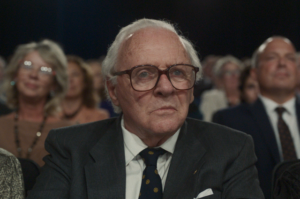“Immaculate” (R, 89 minutes, in theaters) stars Sydney Sweeney as a nun who competes in a wet T-shirt contest.
OK, that’s a lie. But it’s not that far from the truth.
Sweeney has proven herself a talented actress when given a chance (such as in the HBO film “Reality” or the HBO series “Euphoria” and “The White Lotus”). She also might be the No. 1 sex symbol in movies these days, and director Michael Mohan isn’t about to let a habit get in the way of putting the actress’s physical attributes on display. (Time for another bath!)
That’s not the problem with “Immaculate” (I’d be a hypocrite if I suggested it is); it’s just an amusingly gratuitous aspect of this supposedly dead-serious horror flick. The problem is just how repulsive “Immaculate” is, without the benefit of a compelling story, or compelling characters, or anything compelling about it.
Sweeney plays Sister Cecilia, an American who transfers to a convent in Italy that serves as a hospice for nuns. Cecilia starts puking, and it turns out she’s pregnant. Only, she swears, she’s a virgin. What could this mean?
Those running the convent think this means she’s awfully special, and that this apparent miracle could lead to something special. But Sister Cecilia comes to realize that dark forces are at play here, and not just because one nun swan dives off a roof to her death and another looks like Boris Karloff.
Things take a turn for the repulsive, with one victim getting her tongue snipped off (that’s what you get for having a potty mouth) and another getting her head bashed in (quite a mess). None of this is particularly scary; it’s just for shock value.
Maybe director Mohan and/or screenwriter Andrew Lobel also intend for there to be some underlying point to all of this. Something about Catholicism and unwanted pregnancies, perhaps. If so, it gets lost in the schlock. BOMB
The things we do for love
When we first meet gym employee Lou, she’s up to her elbows unplugging a feces-stuffed toilet.
When we first meet bodybuilder Jackie, she’s getting banged from behind in the front seat of a car by a sleazeball named J.J. When J.J. grunts to a finish, he declares, “That was magical!”
Welcome to the lurid world of “Love Lies Bleeding” (R, 104 minutes, in theaters), a neo-noir directed and co-written by Rose Glass (“Saint Maude”).
Set in 1989 New Mexico, this uncompromising crime thriller blends elements of the Coen brothers’ “Blood Simple,” the Jim Thompson adaptation “The Killer Inside Me” and “The Postman Always Rings Twice,” with just a touch of “Of Mice and Men” (with toilet explorer Lou sometimes playing George to steroid-addled Jackie’s Lenny).
When Lou (Kristen Stewart) spots muscular newcomer Jackie (Katy O’Brian) working out at the gym, it’s lust at first sight. They hook up that night, and a passionate relationship is born.
Family matters interfere. J.J. (Dave Franco) is Lou’s brother-in-law, who abuses Lou’s sister, Beth (Jena Malone). J.J. has gotten Jackie a job at the shooting range owned by Lou’s father, local crime boss Lou Sr. (Ed Harris, bald on top, straggly long hair on the sides and back, looking particularly intimidating). Lou hates J.J. and her father, for good reason, and Jackie decides to help out.
Things get bloody, thanks in part to ‘roid rage.
In keeping with its hard-boiled genre, “Love Lies Bleeding” is a nasty piece of work, with cringe-inducing scenes of violence and a relentless coldheartedness. With its attention-getting tracking shots, midnight body-disposal and cynical one-liners, it’s a little too much like “Blood Simple,” the superior film of the two if only for M. Emmet’s Walsh’s work as the comically corrupt villain. (Walsh, a top-tier character actor, just died on March 19 at age 88.)
Still, there’s a lot to appreciate here. Stewart, seemingly ever-evolving as an actress, gives possibly her best performance to date as the inarticulate, often contradictory Lou. She provides the center of the film (“heart” would be inappropriate), though O’Brian’s buff, sexy, volatile Jackie is the showier, more memorable role. Franco and Harris are perfect – as in perfectly despicable. *** (out of four)
Keaton a double threat in ‘Knox’
“Knox Goes Away” (R, 114 minutes, in theaters) hasn’t gotten much attention, but it should.
Michael Keaton – who also directed – plays the central character, John Knox, a veteran hit man who learns he has a particularly virulent variation of Alzheimer’s disease. The doctor who gives him the bad news tells him that he only has weeks, not months, to put his affairs in order.
Meanwhile, Knox’s estranged son (James Marsden) comes to him for help with a big (and I mean big) problem, which gives him an opportunity to redeem himself if he’s up to the challenge. Further complicating matters: John has messed up on his last job – Isn’t that the way it always goes with that “one last job”? – and the cops are closing in on him.
Since his star-making supporting performance in 1982’s “Night Shift,” Keaton has shined in such films as “Batman” and “Batman Returns,” “Jackie Brown,” “Birdman or (The Unexpected Virtue of Ignorance)” and “Spotlight.” Knox is one of his most challenging roles, as it requires him to play a character struggling with shifting mental capabilities, and Keaton – who apparently works well with himself as director – is up to the task. He’s outstanding.
To his, and the film’s, credit, there’s no attempt to soft-pedal who and what John Knox is. He’s not a killer for hire who suddenly becomes Mr. Warm and Fuzzy. Yes, he tries to do a few things right before he “goes away,” and he’s shown to have a good side. But there’s no sudden, cathartic breakthrough, no declaration of repentance. Instead, he simply says, “I’m looking forward to forgetting a few things,” and then does what he can with the time he has left.
Keaton gets strong support from Al Pacino, as a pal and thief; Marcia Gay Harden, as Knox’s ex, who still has feelings for him; and, especially, Joanna Kulig (so great in “Cold War”), as a call girl who comes to Knox’s home once a week.
The plot is good, but the characters, and how they’re played, are what make “Knox Goes Away” compelling. The movie isn’t playing in many theaters (at least, on the Cape), but it’s worth seeking out. ***½
Missed opportunity
There’s a sweet movie buried in “Ghostbusters: Frozen Empire” (PG-13, 115 minutes, in theaters).
The fifth entry in the “Ghostbusters” franchise picks up the story with former science teacher Gary Grooberson (Paul Rudd) and the Spenglers, Callie (Carrie Coon) and her teen kids Trevor (Finn Wolfhard of “Stranger Things”) and Phoebe (Mckenna Grace), running the Ghostbuster business in New York City.
A new ghost monster is unleashed – I won’t go into the details – and the usual mayhem ensues. Original Ghostbusters Peter Venkman (Bill Murray, mostly sleepwalking), Ray Stantz (Dan Aykroyd) and Winston Zeddemore (Ernie Hudson) and their former receptionist Janine Melnitz (the great Annie Potts) join the fight, along with new characters played by Kumail Nanjiani and Patton Oswalt.

“Ghostbusters: Frozen Empire” stars, from left, Finn Wolfhard, Carrie Coon, Paul Rudd and Mckenna Grace. (Sony Pictures)
It’s all pretty much what you would expect from a “Ghostbusters” comedy, with the heroes using proton guns to battle monstrous specters that occasionally douse the humans with ectoplasm (green ghost slime). The action scenes are the least interesting parts of the film, and, as the action increases, the film becomes increasingly uninspired.
But, earlier on, 15-year-old Phoebe befriends 16-year-old ghost Melody (Emily Alyn Lind), who has been separated from her family in the afterlife. The scenes with these two characters – playing chess in a park, becoming closer despite their apprehensions about each other – are surprisingly moving, and could have formed the heart of a much better movie instead of serving as a mere subplot. Lind, mysterious and heartbreaking, is especially good in these encounters, and if the “Ghostbusters” series continues (no reason to think it won’t), those in charge should be sure to bring her back. **½
Making life count
Some movies are on the side of the angels. “One Life” (PG, 109 minutes, in theaters) is one of them.
True to its title, it shows how one person – one life – can make a huge, positive impact on the lives of so many.
It tells the true story of Nicholas Winton, a British broker who helped to save hundreds of Jewish children from the clutches of Hitler. The film is set in 1988, with Anthony Hopkins playing the elderly Winton and Lena Olin as his wife, Grete, and, with flashbacks from 50 years earlier, with Johnny Flynn as the young Winton and Helena Bonham Carter as his mother, Babi.
The younger Winton visits Prague in December 1938, and discovers refugee families living there in poverty while trying to escape the Nazi regime. Hitler’s forces are soon to take over the city, but Winton decides to do whatever he can to transport as many of the families’ children to the relative safety of Great Britain. Other, more experienced volunteers consider him naive, his goal near impossible, but he presses on, dealing with government bureaucracy and other logistical challenges (including finding British families to agree in advance to take in these children) to save as many lives as possible.
Though there’s some suspense as to whether each trainload of kids will make it out of the station, Winton’s efforts – sending out letters, making phone calls, meeting with government officials – aren’t exactly cinematic. Directed by James Hawes (episodes of “Black Mirror” and “Slow Horses”), “One Life” comes across like a well-crafted, but modest TV movie, which you might remember for its story, rather than how the story is told.
Despite his remarkable success in saving children, Hopkins’ aged Winton struggles with guilt and remorse for those he failed to rescue. Sometimes, sadly, you can never do enough, the film suggests, but you can do a lot if you try. ***
** Click here for Tim Miller’s previous movie columns for Cape Cod Wave **
Please like Cape Cod Wave on Facebook.
Cape Cod Wave Magazine covers the character & culture of Cape Cod. Please see our Longform stories.
Tim Miller is co-president of the Boston Society of Film Critics and a Tomatometer-approved critic. He teaches film and journalism at Cape Cod Community College in West Barnstable. You can contact Tim at [email protected] or follow him onTwitter @TimMillerCritic. Or you can ignore him completely.




































